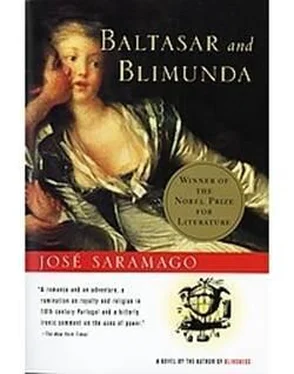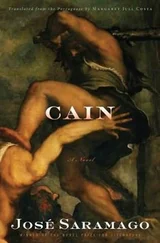José Saramago - Baltasar and Blimunda
Здесь есть возможность читать онлайн «José Saramago - Baltasar and Blimunda» весь текст электронной книги совершенно бесплатно (целиком полную версию без сокращений). В некоторых случаях можно слушать аудио, скачать через торрент в формате fb2 и присутствует краткое содержание. Жанр: Современная проза, на английском языке. Описание произведения, (предисловие) а так же отзывы посетителей доступны на портале библиотеки ЛибКат.
- Название:Baltasar and Blimunda
- Автор:
- Жанр:
- Год:неизвестен
- ISBN:нет данных
- Рейтинг книги:5 / 5. Голосов: 1
-
Избранное:Добавить в избранное
- Отзывы:
-
Ваша оценка:
- 100
- 1
- 2
- 3
- 4
- 5
Baltasar and Blimunda: краткое содержание, описание и аннотация
Предлагаем к чтению аннотацию, описание, краткое содержание или предисловие (зависит от того, что написал сам автор книги «Baltasar and Blimunda»). Если вы не нашли необходимую информацию о книге — напишите в комментариях, мы постараемся отыскать её.
Baltasar and Blimunda — читать онлайн бесплатно полную книгу (весь текст) целиком
Ниже представлен текст книги, разбитый по страницам. Система сохранения места последней прочитанной страницы, позволяет с удобством читать онлайн бесплатно книгу «Baltasar and Blimunda», без необходимости каждый раз заново искать на чём Вы остановились. Поставьте закладку, и сможете в любой момент перейти на страницу, на которой закончили чтение.
Интервал:
Закладка:
Domenico Scarlatti had requested the King's permission to go and inspect the future convent. He was offered hospitality by the Viscount, not because the latter was particularly fond of music, but, since the Italian was music-master of the Royal Chapel and tutor to the Infanta Dona Maria Bárbara, he was regarded by the Viscount as a corporeal emanation from the palace itself. One can never tell when hospitality might be generously rewarded, the residence of the Viscount is no lodging-house, so just as well to choose one's guests with care. Domenico Scarlatti played the Vicount's harpsichord, which was sadly out of tune, the Viscountess listened to him playing in the evening with her three-year-old daughter, Manuela Xavier, on her lap and of all those present in the room, the child was the most attentive, she kept moving her little fingers in imitation of Scarlatti until she exhausted her mother's patience and was entrusted to her governess. There would not be much music in the child's life, tonight she would be asleep while Scarlatti played, and ten years from now she would die and be buried in the Church of St Andrew, where she still lies, if there is any place for such wonders on this earth, perhaps she will hear the music played by the water on the harpsichord that was thrown into the well of São Sebastião da Pedreira, if the well is still there, for sources of water are destined to become exhausted and filled in.
The musician made his way to the site of the convent and caught sight of Blimunda but they pretended not to know each other, for it would have aroused surprise and suspicion in Mafra if the wife of Sete-Sóis were to be seen socialising with the musician who is staying as a guest at the Viscount's residence, What can he be doing here, perhaps he's come to inspect the building, but why, if he is neither a mason nor an architect, and there is no organ as yet for any organist to play, no, there must be some other reason. I've come to tell you and Baltasar that Padre Bartolomeu de Gusmão has died in Toledo which is in Spain, to where he had escaped, and according to some, he was mad, and since no one mentioned you or Baltasar, I decided to come to Mafra to find out if you were still alive. Blimunda joined her hands, not as if she were praying, but like someone about to strangle her own fingers, Padre Bartolomeu Lourenço is dead, This is the news that reached Lisbon, On the night when the machine crashed into the sierra, Padre Bartolomeu Lourenço ran off and left us and returned no more, And the machine, It's still there, what shall we do with it, Guard and protect it, perhaps one day it will fly again, When did Padre Bartolomeu Lourenço die, They say it was on the nineteenth of November, and his death was marked in Lisbon that day by a great tempest, if Padre Bartolomeu de Gusmão were a saint, it could be a sign from heaven, What is it to be a saint, Signor Scarlet, You tell me, Blimunda.
The next day, Domenico Scarlatti departed for Lisbon. At a bend in the road outside town, Blimunda and Baltasar were waiting for him, the latter had forfeited a quarter of his daily wage to be able to bid the musician farewell. They went up to his carriage like beggars about to ask for alms, Scarlatti ordered the driver to stop and stretched out his hands to them, Farewell, farewell. In the distance, cannon fire could be heard, as if some feast were being celebrated, the Italian looks sad, and that is not surprising if he is coming away from the feast, but the others, too, look sad, and why should this be since they are going back to the feast.
S ITTING ON HIS throne amid the radiance of the stars, with his mantle of night and solitude, and with the new sea and dead eras at his feet, is the only emperor who truly holds the globe of the universe in his hand, these are the words with which the Infante Dom Henrique will be acclaimed one day by a poet who is not yet born, everyone has his own preferences, but if we are speaking of the globe of the universe and of the empire and of the riches that empires yield, then Dom Henrique is a feeble monarch when compared with Dom João, the fifth sovereign with that name on the roster of kings, sitting in a chair with arms made from lignum vitae, where he can rest with greater comfort and pay closer attention to the accountant who is drawing up an inventory of the realm's possessions and riches, silks, fabrics, porcelain, lacquered goods, tea, pepper, copper, ambergris, and gold from Macao, unpolished diamonds, rubies, pearls, cinnamon, bales of cotton, and saltpetre from Goa, rugs, furniture upholstered in damask, and embroidered bedspreads from Diu, ivory from Melinde, slaves and gold from Mozambique, from Angola more black slaves but not so sturdy as those from Mozambique, and the best ivory to be found in Western Africa, timber, manioc flour, bananas, yams, poultry, sheep, goats, indigo, and sugar from São Tomé, some black slaves, wax, hides, ivory, for not all ivory comes from elephant tusks, from Cabo Verde, woven materials, wheat, liqueurs, dry wines, spirits, crystallised lemon peel, and fruits from the Azores and Madeira, and, from the various regions of Brazil, sugar, tobacco, copal, indigo, wood, cotton, cacao, diamonds, emeralds, silver, and gold, which alone gives the realm twelve to fifteen million cruzados annually in the form of gold dust or minted coins, not to mention the bullion lost at sea or stolen by pirates, and though it is true that not all of this represents income for the crown, which is rich but not all that rich, more than sixteen million cruzados all told go into the royal coffers, the tax alone, which is levied for navigating the rivers that lead to Minas Gérais, yields thirty thousand cruzados, the Good Lord worked so hard to open up channels where waters might flow, and along comes a Portuguese king to impose a profitable toll.
Dom João V ponders how he will spend these enormous sums of money and such excessive wealth, he ponders the matter today just as he pondered it yesterday, only to come to the same conclusion, that the soul must be his primary consideration, we must preserve our soul by all possible means, especially when it can also be consoled by material comforts on this earth. Let the friar and nun have what is necessary, even what is superfluous, because the friar remembers to put me first when he prays, and the nun arranges the folds of my sheet and provides other little comforts, and if we pay Rome handsomely for the upkeep of the Holy Office of the Inquisition, she is paid even more for less cruel services, in exchange for ambassadorships and gifts, and if from this impoverished land of illiterates, rustics, and unskilled craftsmen one cannot expect refined arts and crafts, let them be brought from Europe for my convent at Mafra, and let all the other necessary adornments and embellishments be bought with the gold from my mines and revenues from my estates, whereby, as one friar will record for posterity, artisans abroad will get rich while we shall be admired for the splendours of our realm. From Portugal all that is required are the stone, tiles, and wood for burning, and men of brute force and empty hands. If the architect is German, the master-carpenters, master-builders, and master-masons are all Italian, and if the traders and other rogues from whom we buy everything are English, French, and Dutch, then you can be quite certain that they import from Rome, Venice, Milan, Genoa, Liège, France, and Holland the bells and carillons, the oil lamps and chandeliers, the candlesticks, the bronze torch-holders, the chalices and the silver-gilt monstrances, the tabernacles and statues of saints to whom the King is particularly devoted, the adornments for the altars, the altar fronts, the dalmatics, the chasubles, the copes, the cords and tassels, the canopies, the baldachins, the albs, the lace cloths, and three thousand walnut panels for the sacristy cupboards and choir stalls, a wood much esteemed by St Charles Borromeo for this purpose, and from the countries of Northern Europe come whole shiploads of timber for the scaffolding, sheds, and lodging huts, and ropes and hawsers for the winches and pulleys, from Brazil, innumerable planks of angelin wood for the doors and windows of the convent, for the flooring of the cells, dormitories, refectory, and other outbuildings, including the steps of the delousing booths, because it is a wood that does not perish, unlike this splintering Portuguese pine, which is only good for heating saucepans and for people to sit on who do not weigh much and have nothing in their pockets. Eight years have now gone by since the first stone was laid for the basilica in the town of Mafra, this one, thank God, came from Pêro Pinheiro, the rest of Europe should remember us with gratitude for the large sums of money they received in advance, not to mention what they charged in instalments as the work progressed and what they received when the project was finally completed, for they provided the silversmiths and goldsmiths, the bell founders, the sculptors responsible for the statues and bas-reliefs, the weavers, lace-makers, and needlewomen, the clock-makers, the engravers and painters, the rope-makers, the sawyers and carpenters, the embroiderers, the tanners, the carpet-weavers, the bell-makers, and the ship-riggers, if the cow that so placidly allows itself to be milked dry cannot be ours, or as long as it cannot be ours, at least let it remain with the Portuguese, for soon they will be buying a pint of milk from us on credit to make milk puddings and meringue desserts, If Your Majesty would care for another helping, Mother Paula solicitously reminds him, you need only ask.
Читать дальшеИнтервал:
Закладка:
Похожие книги на «Baltasar and Blimunda»
Представляем Вашему вниманию похожие книги на «Baltasar and Blimunda» списком для выбора. Мы отобрали схожую по названию и смыслу литературу в надежде предоставить читателям больше вариантов отыскать новые, интересные, ещё непрочитанные произведения.
Обсуждение, отзывы о книге «Baltasar and Blimunda» и просто собственные мнения читателей. Оставьте ваши комментарии, напишите, что Вы думаете о произведении, его смысле или главных героях. Укажите что конкретно понравилось, а что нет, и почему Вы так считаете.












